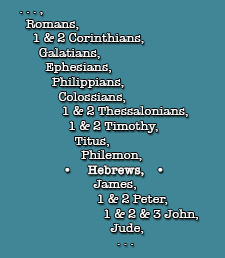
Facilitated by Warren Camp
Brand-new series: You can study on your own or with others.
“Hebrews” Introduction: Questions / Answers
Before delving into the meaning of text of "Hebrews," this introduction will answer a few preliminary questions to help familiarize ourselves with the accounts therein. First, don't be concerned with whether to call this account an epistle, letter, or book; any and all titles are appropriate and will be used interchangeably throughout each of Warren Camp's Hearty Boys "Hebrews" commentaries.
Second, this letter to the Hebrews is one of Scripture’s most mysterious writings; its language can often appear puzzling. It's also something of an adopted letter: It doesn't fit within among Paul’s thirteen letters (Romans through Philemon); neither do we find it subsequently tucked in with the letters written by Apostles James, Peter, John, and Jude. Instead, we find that the Church has positioned "Hebrews" between both of those letter groups, perhaps indicating the special importance within the New Testament's collection of writings.
Add to that the fact that the letter's author cannot be determined conclusively. Regardless of whose hand held a split-reed pen to this letter's papyrus, the Holy Spirit of Jesus is the divine author of all Scripture (2 Timothy 3:16).
Additionally, confusing comparisons can be made: The author compares and contrasts righteous Jesus with prominent figures and operations of Old Testament Jewish faith. Readers sometimes perceive a division between both religions, as though the Church had replaced the Synagogue with respect to how one receives God’s gift of salvation. They wonder: What practical application(s) do the many comparisons between Jesus and Jews have for us today?
Despite the confusing comparisons we'll examine in various chapters, it's essential that we realize and remember that the Lord Jesus occupies the central place herein. It's through such comparisons that Jesus' superiority will be revealed: He's greater than angels, Moses, the Torah, priests, Melchizedek, blood sacrifices, and God's original covenant with his people. Make no mistake about it, Jesus is the Word of God; he's the hope of a new creation; he acts as our eternal priest; and becomes ultimately the perfect sacrifice. Thankfully, the author of "Hebrews" documents how Jesus is the ultimate revelation of God's love and mercy, making him worthy of our devotion.
Questions about Hebrews
Who wrote this letter to the Hebrews?
The author of the letter to the Hebrews will remain a mystery. Several theories regarding the author’s identity have been proposed over the centuries, but all of them carry significant obstacles. Most of the churches in the eastern part of the Roman Empire believed that Apostle Paul was the author of this letter. But, missing in it are Paul’s usual "greeting and salutation" and polished rhetorical style, which we find customarily throughout his letters (listed above). Some suggest that Luke authored it, while others propose that it might have been written by Apollos, Barnabas, Silas, Philip, Clement of Rome, or Aquila and Priscilla.
Incidentally, Bible scholar F F Bruce (1910–1990) wrote that "Hebrews was one of the New Testament books which was recognized as being a part of the canon of Scripture later than others. It was not until late in the fourth century that 'Hebrews' was officially accepted as part of the New Testament, and this was perhaps largely due to the fact that Pauline authorship was assumed at that point in time."1 This letter's unknown authorship shouldn't shake our confidence in its authority. "Hebrews" adds important theological contributions to the Holy Bible; since the late first century, it's been deemed to be sacred Scripture that Christians have consistently endorsed and upheld for two millennia. So, who might have been the writer of "Hebrews" that scholars have debated for centuries? Perhaps the best response might be from one of the early church fathers who wrote: "Only God knows."
When, where, to whom, and why was this letter written?
When? No precise date can be set for the writing of "Hebrews." However, several clues can help us arrive at an approximate date. The strongly Jewish character of the letter written to the Hebrews helps narrow down when it was composed: Likely AD 64–69, because it makes absolutely no reference to the subsequent destruction of the temple at Jerusalem in AD 70. Further, we see in the text of 13:23 that Timothy, then alive, is mentioned as being a companion of the author when this epistle was written. Add to that the fact that the author wrote as if the sacrificial system were still in existence (10:1–2, 11).
Where? Unlike other biblical writings, the author writes very little about to whom it was addressed, why it was written, and where it was written. And because no locale was mentioned, we also don't know where its recipients lived. We can make only educated guesses. All we can safely conclude is that "Hebrews" was written to a local congregation of Jewish Christians with whom the writer was familiar. Fortunately, this letter's lack of specific details doesn't affect the letter's timeless truth.
To Whom? Unfortunately, the author didn't specify or address the letter's recipients. Interpretors have offered four major options: (1) Jewish Christians, (2) Gentile (non-Jewish) believers, (3) a congregation composed of both Jewish and Gentile Christians, or (4) a specific group within a congregation. Elements in this letter seem to support the first option. The writer's extensive use of Old Testament quotations, allusions to the Tabernacle and its sacrificial system, references to the role of Jewish priests — in particular, the office of the high priest — likely indicate a Jewish-Christian congregation of believers, possibly living in Rome.
The writer warned the Jewish-Christian readers of his letter about the peril of committing apostasy — that is, renouncing their Christian faith and returning to Judaism. Some Jewish Christians were still attracted to Judaism's rituals and were reluctant to leave Judaism's shadow. In order to guard readers' hearts against falling away, the author of "Hebrews," seeking to correct them, makes an effort throughout the letter to demonstrate the absolute supremacy of Jesus Christ. He'd aimed his address at Jewish believers who'd stagnated in their spiritual growth and found themselves lagging in their service for Christ.
With its myriad references to Hebraic customs and the Old Testament, "Hebrews" was likely directed to a mixture of saved and unsaved Jews. The writer wanted Christian-Jews to commit themselves fully to the Christian credo. Some members of the congregation had professed faith in Christ, but they gave no evidence of that commitment. So the writer urged them to examine their initial commitment to Christ to determine whether it was genuine. The writer also addressed Gentile believers who became discouraged with Christianity and were tempted to revert to paganism. The writer sought to inspire believers to become involved in Christianity's world mission. Whatever the author's specific purpose, he communicated it to his readers and hearers using the greatest of pastoral care and concern.
Why? Alas, neither did the author suggest the situation that prompted the writing of this letter. Nevertheless, "Hebrews" very clearly presents the priestly ministry of Christ in believers' lives, then and today. Jesus, acting in two capacities simultaneously — as the divine Messiah and the incarnate Son of God serving in a priestly role — made it possible for humans to approach Father God, in heaven, through prayer (4:14–16). Jesus' New-Testament priesthood is shown to be superior to the Old Testament priesthood of Aaron; only through Jesus can one receive eternal salvation (5:1–9). Additionally, by offering himself as a sinless sacrificial lamb, on behalf of humanity's sins (7:24– 9:28), Jesus became the perpetual and peerless High Priest.
What are some of its key points?
Several major themes arise when reading this epistle. Because of these developed themes, "Hebrews" is one of the most significant books in the New Testament for understanding the relationship between the old and new covenants. We'll note a few of them here: (1) As God's one and only Son, Jesus Christ is God's final Word. As such, he's superior to the many ways by which God revealed himself in the past, namely by the prophets, the angels, and Moses. Such superiority enables Jesus to be the Mediator of a new and superior covenant; (2) the letter's recipients must also pay close attention to the gospel message they've heard, by which they're saved from the curse of sin and death. They must persevere in faith because neglecting their faith in Christ would have perilous consequences; (3) another theme pertains to Christ's priestly role. In order to become God's merciful, faithful, and perfect high priest, Jesus shared our humanity while providing us with a viable means of atonement.
The book of "Hebrews" is difficult to classify as a type of writing. It begins as an essay or speech does, continues like a sermon, and ends the way a letter does. It's quite possible that "Hebrews" was one or more sermons that had been written in letter form to be read aloud to a specific community or group.
This introduction presents three essential high points of this "Hebrews" message: (1) The letter portrays Jesus as being "better than the angels" by improving human life through the valuable gift of salvation; (2) the author depicts Jesus as being capable of truly offering a better future hope than what Mosaic Law had promised the letter's recipients, by his becoming a superior, one-time sacrifice for people's sins, better than what a slaughtered sheep, ram, bull, or goat could have provided; and (3) this letter confirms that Jesus provides a more beneficial inheritance in heaven for those who choose to fully trust him (1:4; 6:9; 7:19; 9:23; 10:34). Jesus, their high priest, is indeed superior to all (8:6).
Such a message highlighting Jesus' superiority would have been relevant and especially important to Jewish Christians in Rome who were struggling under Nero’s persecution. Many of the early Jewish believers in Jesus had been backsliding by prioritizing the practices, rites, and rituals of Judaism, in order to escape mounting persecution. Because some believers were considering moving back toward Mosaic Law, the writer showed these Jewish Christians that, although they faced suffering, they were certainly following a better way and ought to continue to make such life-changing efforts.
Repetition in “Hebrews”
Learning to identify the repetition of important words or phrases in relatively short blocks of Scriptures can help Bible-studying disciples better recognize and recall essential doctrines and principles in the Scriptures. Ancient prophets often emphasized key teachings by repeating them. As you go through this weekly Bible study, you'll probably be surprised at how many times the author repeats important words throughout this letter. On numerous pages of this study, you'll fine references to such repeated words that are used throughout this epistle such as "blood," "better," "covenant," "high priest," "promise," "perfect," "eternal," and so on.
How familiar are you with these passages?
Do you recall key verses from your previous readings and studies of "Hebrews"? Here are a few:
Hebrews 1:1–2; 2:3 4:12; 4:14–16; 5:11–14; 6:11–12; 7:20–22; 8:13; 9:15; 10:15–18; 11:1; 11:6; 12:1–2; 13:5; 13:8.
How is “Hebrews” applicable for us today?
"Hebrews" is just about the most Christ-centered book of the New Testament. It helps us understand the relationship between Jewish and non-Jewish Gentile believers and between Israel and the church. In effect, it's an "appeal letter" demonstrating that Christ is sufficient. He's greater than anything you could imagine as being essential in your life. The author had written this appeal letter to some victimized believers, many of whom were abandoning their faith because of Rome's persecution of them. So, the author systematically sets up what these Hebrew-minded believers in Jesus would think might be more sufficient than Christ; he then knocks down each of them.
The author starts contrasting Jesus' superiority to angels, Moses, Melchizedek, the Law, the Aaronic priesthood, and more. He basically argues that all of these individuals and instruments of the Old Testament point directly to Christ who fulfills them all, is greater than all of them, and casts his shadow on all of these great biblical figures. He exalts the person and work of Christ Jesus, prompting us to personally draw near to and engage with him. The author is basically arguing the centrality of the sufficiency of Christ Jesus who's essentially appealing to his audience, attempting to demonstrate that he's worth all the persecution they were facing, worth all their pain and ridicule because he's greater than all those esteemed elements to which the readers of his day would potentially return. So, while "Hebrews" is an ancient epistle, it has immense practical applications for today's readers! Those of us who might be drawn away from the sufficiency and centrality of the worship of Christ toward the other things that are out there ought to see how Christ overshadows them.
As Dr. David Jeremiah asserts, "Christ's priesthood is superior to the Old Testament priesthood of Aaron and his offspring. It's an everlasting priesthood because Christ never dies. While Aaron and all of his sons die, Christ's priestly self-sacrifice is all sufficient and eternal. This letter instructs that an obedient faith that pursues peace, love, and holiness is a necessary requirement to enter heaven — Father God's promised rest. For this reason, "Hebrews" elevates faith-filled heroes (highlighted in chapter 11) from Israel's history as examples of (a) obedience to God's living and effective Word and (b) commitment to the confession and perseverance in faith."
Finally, we're instructed herein that our heavenly Father disciplines all whom he receives as his children. While no discipline seems enjoyable at the time, believers who are thereby trained will enjoy the benefits of a new and everlasting covenant. As the writer affirms in chapter 8 of his brief exhortation, the main point is this: We have a high Priest who is Jesus Christ; he is superior in every way to the good but nonetheless incomplete revelation of God found in the Old Testament.
Got Faith? "Hebrews" not only invites and dares us to live by faith, it gives us a number of practical examples of how we're to do that. Rich in foundational Christian doctrine, this epistle to the Hebrews presents encouraging examples of God's "faith heroes" who'd persevered, despite considerable challenges and adverse situations. These members of God's "Hall of Faith" provide us with overwhelming evidence as to the absolute assurance and outright dependability of God. We ought, therefore, to make the effort to actively prioritize our trust and confidence in God's rich promises, no matter the conditions, by focusing devotedly on the promised faithfulness of God's work in our lives.
Clearly, the book of "Hebrews" is one of the most challenging books of the New Testament. It offers so much, yet we may never uncover more than a small portion of what it teaches. However, we can benefit in many ways from these complex teachings that prod us to press on to maturity while warning us of the danger of being complacent. We modern followers of Christ face temptations that sometimes enable us to compromise our commitments to Jesus and fall away. This letter summons us to endure and persevere, especially when significant temptations and persecution come upon us.
This letter to the Hebrews essentially assures us that, if we'll devotedly open our hearts to allow what its author urgently exhorted his original audience, we too will see how crucial it is that we stand strong in our faith, no matter what challenges or opposition or persecution we'll face. So let’s take on the challenges and appeals of the book of "Hebrews," for it's God's Spirit of truth speaking to us. Let’s make the effort to dig deeply into our upcoming studies and discussions. Having done so, we'll be eligible to partake of the scriptural feast that God has presented to us, looking at Jesus who's truly the author and finisher of our faith (Hebrews 12:2).
Intro Video: “Hebrews”
† Watch this overview video created by BibleProject.




